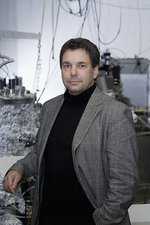
Dear Reader,
Thank you for your interest in the research achievements of our still very young university. Whereas in 2007 our first Research Report focused on selected institutes and our priority fields of research, this year all eleven departments and faculties are reporting their research activities over the past two years. In future, we will alternate yearly between a selection of research results that have attracted national and international attention, and the achievements of the faculties as a whole. This format is designed to give readers a comprehensive and colourful picture of research activities at our university. The diversity of the various disciplines and their structural differences reflect the universitys status as one of the largest in Germany, and this diversity is highlighted in the present Research Report.
The university now has no less than five priority areas of research, which are listed below. Together they offer an innovative transdisciplinary and interdisciplinary environment for researchers from all backgrounds, a forum for scientific exchange, and a constant source of fresh impetus for future research in:
- Nanosciences,
- Genetic Medicine and Medical Biotechnology,
- Empirical Research in Education,
- Urban Systems,
- Change in Contemporary Societies.
Already the faculties and departments are
reporting collaborations which cut across disciplinary and departmental boundaries and are fast developing into sustainable, research-intensive clusters of international interest. These specialist fields are the firm yet dynamic foundation of research at our university, and the basis on which the centres of excellence and core research areas can build in future.
Research at our university is attracting increasing international attention, as the many Collaborative Research Centres, Research Training Groups and other evaluated programmes testify. We therefore have every reason to be
optimistic: by constantly sharpening and developing its research profile, the University of Duisburg-Essen will put itself on the map as a place of innovative, research-based teaching and learning, and will secure its long-term competitiveness in higher education at national and international level.
Of one thing I am certain: research at the international cutting edge, tied up with excellent teaching, is and remains the way forward for the University of Duisburg-Essen to become one of Germanys leading centres for research and education, attracting international attention and with its own unmistakable profile. I very much hope that this report will inspire you to learn more about our university and draw on our researchers wealth of knowledge and experience in future collaborations.
I hope our Research Report 2008 will prove to be an enjoyable read and will leave you with a new and perhaps unexpected impression of
the many facets of research at the University of Duisburg-Essen.
Your Prof. Dr. Michael Farle
Vice-Rector for Research, Junior Academic Staff &
Knowledge Transfer

